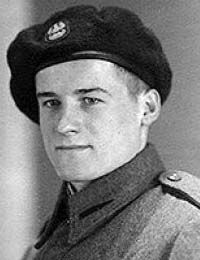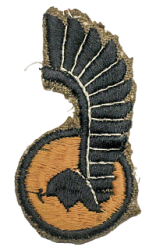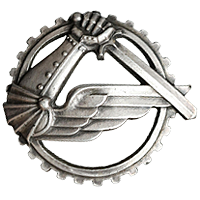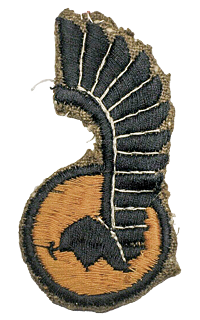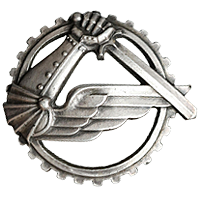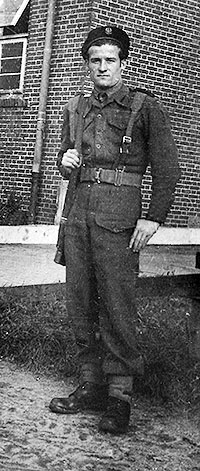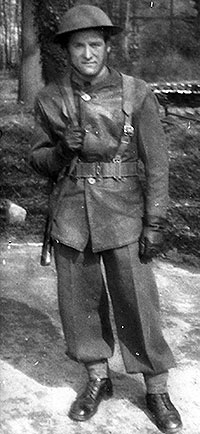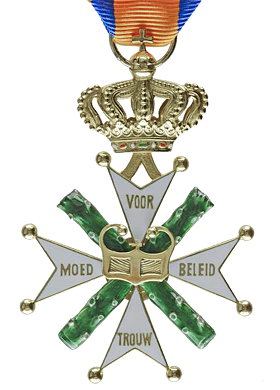The Second World war grows more distant in history every day, but not in the home of Roman Figiel, born in Poland in 1926 war veteran. All the way from Poland as a young man he helped expel the Nazis from Breda and places as Baarle-Nassau and Gilze. In Breda, 'on' Ginneken, he found his love Joke de Vetter (1927) 2011 65 years with whom he had married in December. The family would have appreciated if the mayor of Breda had come to congratulate them, but they only show up when platinum wedding couples and that saves him a lot of work is greatly appreciated for who is the data together and joined in matrimony 70 years to catch up. In particular son Ad Figiel had appreciated the arrival of the mayor as a tribute to a liberator of Breda. Knowing that of these Polish veterans there are only a few alive, probably only seven and not everyone is approachable any more due to their age.
It doesn't seem to bother Roman Figiel as much as his son Ad, but that could also be show. Only after some urging of his son, he gets up, leaves the room and comes back with a jacket. The garment is moody blue. Underneath the gray suit pants. On the breast of the jacket the medals, honorary signs that adorn the men who put their lives on the line suggested people's freedom and could retell were honored. The jacket of Roman Figiel is adorned with six medals from England, Poland, France, Canada. One of the medals recalls the participation of the elderly Polish veteran at the Battle of Arnhem, the battle of 17 to September 25, 1944 in and around Arnhem took place as part of Operation Market Garden. At the Battle of Arnhem was including the 1st Polish Armoured Division involved, the army unit where Roman Figiel joined after a life as forced labor for the Germans.
When he showed the jacket with a certain nonchalance he hangs it back on the coat rack and he begins fiddling in a cabinet in the living room. There are many more memories of the Second World War. In an envelope are original prints of photographs of a German concentration camp. The indescribable horrors that everyone after the war only know from hearsay, are the photos in their most confrontational directness. As the picture of forced laborers with bare torsos who us hooks to pull a naked and emaciated body in an incinerator. In another photograph rows are dead bodies waiting to be burned. Then grabs Roman Figiel a box. The content represents the end of this horror story. It is a medal in 2004, on the occasion of sixty years of liberation of Breda. This medal is the name associated with General Stanislaw Maczek, commander of the 1st Polish Armoured Division. His name is still spoken with great respect in Breda and surroundings. Streets are named name, as well as the museum in Breda that is dedicated to the brave men and women of the military unit. Genelaal Maczek died in 1994 at the age of 102. He is buried in the Polish cemetery in Breda.
Roman Figiel says to attachgreat value to the medal commemorating the sixty years of liberation of Breda, but his finest moment he experienced was on May 5, 2012 when the annual National Liberation Day was celebrated in Breda. It was Crown Prince Willem Alexander, Prime Minister Mark Rutte, the President of Germany and the Polish ambassador present. In the presence of grandson Joey (23) he was with these dignitaries. He observes: "Now there are almost no Polish veterans alive anymore, something is being done for us." Of the three hundred Poland after World War II in Breda build a new life, three of the party were 5 May 2012. The wry observation of Roman Figiel is the other side of what he called 'mixed feelings' mentions that the Polish liberators have always had. "It is the Polish national character not always want to be. In the foreground" Still, no man can without appreciation and the first time that in his opinion there was really concerned with, was to commemorate fifty years of liberation of Breda. The war heroes were driven through the city at war vintage. It was folded, it rained flowers. "When I first had the feeling that we were appreciated."
The main reason for Roman Figiel not to return to his Polish homeland back after the liberation sitting across from him in a comfortable chair: Joke de Vetter, or as she puts it with a slightly mocking undertone: "Ich." And she continues: "It was not love at first sight. I was cleaning in my parents' bedroom. I looked at a farmyard. There were a few Polish military vehicles. " He: "They knocked a duster out through the open window. I waved to her, but hear nothing, no contact. " She: "I still see him for me. He was wearing a yellow scarf. Later he told me that this yellow scarf protected them from Allied bombing of kites".
Roman Figiel had a few more reasons to stay in Breda. Poland had been occupied by the Russians established a communist reign of terror. Polish soldiers who had fought on the side of the Allies were declared stateless. Their life was uncertain and often ended in Siberia, if they survived their return. The third reason was the fact that the whole family of Roman Figiel as a result of the war had fallen. Completely apart "What was I going to do there," he asks in all seriousness off.
His personal war story begins with the shooting of his eldest brother by the Germans. The family from the village Janow near Katowice had five boys and two girls. Father was a miner. The eldest brother was married and had children. He was forced by the Germans to work in Germany. There he heard that his wife was carrying on with the Germans. He escaped and pounded in blind anger with his fists on the Germans. They shot him dead. In retaliation, his father work slave. Two brothers suffered the same fate. Roman Figiel took all kinds of jobs to the poverty-stricken family to bring in some money. "The people said:" The war is coming. "For me there was the beginning of the war that I saw how the Germans walked into our village. Our whole family got involved in the war. The family fell completely apart. My older brother said, "Let's go away." We just parted ways. My brother wandered through Europe, could join the Canadians and fluid including at Monte Casino in Italy. After the war he settled in Canada. I was picked up by the sleeve and put to work. Across Europe, I had to work for the sleeve. So I came up in France. I worked among other military defenses. I escaped and I reported to the Americans. Who had just landed in Normandy. They have brought me to Scotland with a boat. There I got a military training. They asked what I wanted to be with and they shared me of the pioneers. I had to build bridges and mine clearance. After three weeks I put my signature as a Polish soldier. I got a Polish uniform. I was in the Polish army. I felt at home. I was included in the group. I was happy to be with comrades again!
Roman Figiel shows a few pictures of his training in Scotland. Several small pictures, on one of the pictures he is with six pioneers. They have a mine-detector with them. When the group arrived in Breda, there were four alive. "We crossed by boat to France. We sailed towards the war. Our first camp in France we camped under fruit trees. On our vehicles we had placed camouflage nets. A few bigwigs studied a crate with a new type of German mines. The crate exploded. The meat of the high military camouflage nets fluttered on which we sat. It was like it was raining. No, I wasn't scared since you were part of a group. Afraid together, you were strong, but it was dangerous. We were bombed by our own planes. We waved our yellow scarves. I lay on my back and I saw the bomb doors open. I waited for the blow and was wondering if these bombs were meant for me. Oh, war is a matter of luck. You need more luck than sense. We built bridges and cleared mines. Only occasionally have we fired on the Germans. But I came across the Germans and against. There had just been an uphill battle. Everywhere there were dead horses and German soldiers. Our army had to go. There was no time. We had the horses and the bodies with bulldozers push them aside. Did you know that dead people are black? And that smell! Not much later I opened a can of corned beef. The content was spoiled and smelled like a rotting body. But when I have learned a cigarette. Never, never have I looped corned beef. "
The advance of the Poles stopped in Baarle-Nassau due to lack of ammunition. The delay lasted three weeks. When Breda was liberated. "When we were in Belgium, told us that we were going to the Netherlands. When we went up to Breda was said to us that we had with all the historic buildings. "After Breda was liberated by the 1st Polish Armoured Division on October 29, 1944 the Poles remained five months in the city. Carefully Figiel restored Roman bridges include Moerdijk and he got involved with the Joke Vetter. End but the Poles moved on, towards Germany. He (then 18) said to her: "I do not know when I'll be back. I write to you, "They (then 17) said." I see "When the war was over was the pastor is not good that they got married. She was Protestant, I was Catholic. "'Tell him we have to get married," she told me. I did not know what that meant, but it worked. "The marriage was consummated on December 7, 1946. At the wedding, he dressed in a military uniform, she wears a white dress for the occasion made of white silk het got hold of in Antwerp. They had two sons. Ad is the oldest, Hans is seven years younger. Ad and Hans each got one son. Roman Figiel took whatever work he could get, such as snow removal and hauling beams. He worked for renowned companies like Breda Etna and the Three Horseshoes brewery. Thirty years he worked at Ericsson in Rijen. Thirty years after the war he went for the first time together with the Ad eldest son back to Poland to still be able to see. His elderly mother once For years maintained Roman Figiel and his wife Joke Polish family by sending them regularly. Food packages "To be able to afford I went picking strawberries, such as Poland, which now do it again. Now I have no contact with Poland. Everyone is dead. Only my brother in Canada is still alive. I looked him up once with Hans. When we landed at the airport upon return, I said, "Hansel, we are in the Netherlands, we are home again."
Roman Figiel
